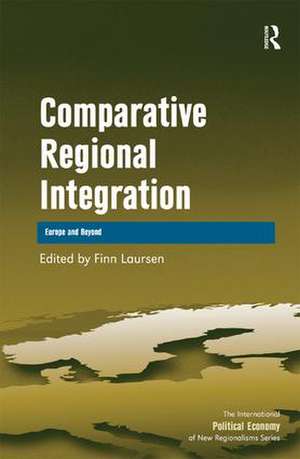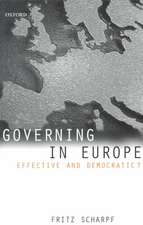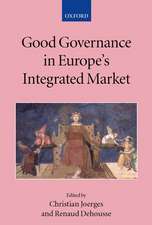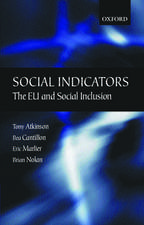Comparative Regional Integration: Europe and Beyond: New Regionalisms Series
Editat de Finn Laursenen Limba Engleză Hardback – 28 apr 2010
| Toate formatele și edițiile | Preț | Express |
|---|---|---|
| Paperback (1) | 181.43 lei 6-8 săpt. | |
| Taylor & Francis – 11 noi 2019 | 181.43 lei 6-8 săpt. | |
| Hardback (2) | 627.49 lei 6-8 săpt. | |
| Taylor & Francis – 22 noi 2017 | 627.49 lei 6-8 săpt. | |
| Taylor & Francis – 28 apr 2010 | 769.37 lei 6-8 săpt. |
Din seria New Regionalisms Series
-
 Preț: 312.34 lei
Preț: 312.34 lei -
 Preț: 311.41 lei
Preț: 311.41 lei -
 Preț: 295.53 lei
Preț: 295.53 lei - 15%
 Preț: 715.33 lei
Preț: 715.33 lei - 15%
 Preț: 672.40 lei
Preț: 672.40 lei - 18%
 Preț: 1060.25 lei
Preț: 1060.25 lei - 18%
 Preț: 1000.27 lei
Preț: 1000.27 lei -
 Preț: 374.20 lei
Preț: 374.20 lei -
 Preț: 374.58 lei
Preț: 374.58 lei - 28%
 Preț: 818.67 lei
Preț: 818.67 lei - 31%
 Preț: 765.43 lei
Preț: 765.43 lei - 18%
 Preț: 1003.43 lei
Preț: 1003.43 lei - 15%
 Preț: 703.90 lei
Preț: 703.90 lei - 30%
 Preț: 768.10 lei
Preț: 768.10 lei - 31%
 Preț: 766.85 lei
Preț: 766.85 lei - 30%
 Preț: 768.64 lei
Preț: 768.64 lei - 18%
 Preț: 1061.81 lei
Preț: 1061.81 lei -
 Preț: 380.54 lei
Preț: 380.54 lei - 31%
 Preț: 766.31 lei
Preț: 766.31 lei - 30%
 Preț: 769.37 lei
Preț: 769.37 lei - 31%
 Preț: 767.20 lei
Preț: 767.20 lei - 30%
 Preț: 770.98 lei
Preț: 770.98 lei - 18%
 Preț: 1054.71 lei
Preț: 1054.71 lei - 28%
 Preț: 821.82 lei
Preț: 821.82 lei -
 Preț: 369.73 lei
Preț: 369.73 lei - 18%
 Preț: 1057.40 lei
Preț: 1057.40 lei - 18%
 Preț: 1005.01 lei
Preț: 1005.01 lei - 18%
 Preț: 1008.17 lei
Preț: 1008.17 lei - 18%
 Preț: 1109.66 lei
Preț: 1109.66 lei - 15%
 Preț: 669.94 lei
Preț: 669.94 lei - 18%
 Preț: 1055.84 lei
Preț: 1055.84 lei - 18%
 Preț: 1006.60 lei
Preț: 1006.60 lei - 18%
 Preț: 703.30 lei
Preț: 703.30 lei - 15%
 Preț: 703.08 lei
Preț: 703.08 lei - 18%
 Preț: 1056.00 lei
Preț: 1056.00 lei - 28%
 Preț: 825.63 lei
Preț: 825.63 lei - 18%
 Preț: 1056.95 lei
Preț: 1056.95 lei - 18%
 Preț: 1000.27 lei
Preț: 1000.27 lei - 18%
 Preț: 1058.38 lei
Preț: 1058.38 lei - 15%
 Preț: 669.94 lei
Preț: 669.94 lei - 30%
 Preț: 849.78 lei
Preț: 849.78 lei - 28%
 Preț: 822.86 lei
Preț: 822.86 lei - 18%
 Preț: 1005.80 lei
Preț: 1005.80 lei - 18%
 Preț: 1056.28 lei
Preț: 1056.28 lei - 31%
 Preț: 766.31 lei
Preț: 766.31 lei - 18%
 Preț: 1057.09 lei
Preț: 1057.09 lei - 18%
 Preț: 1108.37 lei
Preț: 1108.37 lei - 30%
 Preț: 847.31 lei
Preț: 847.31 lei - 28%
 Preț: 737.94 lei
Preț: 737.94 lei
Preț: 769.37 lei
Preț vechi: 1105.82 lei
-30% Nou
Puncte Express: 1154
Preț estimativ în valută:
147.24€ • 159.88$ • 123.68£
147.24€ • 159.88$ • 123.68£
Carte tipărită la comandă
Livrare economică 22 aprilie-06 mai
Preluare comenzi: 021 569.72.76
Specificații
ISBN-13: 9781409401810
ISBN-10: 1409401812
Pagini: 312
Dimensiuni: 156 x 234 x 25 mm
Greutate: 0.74 kg
Ediția:1
Editura: Taylor & Francis
Colecția Routledge
Seria New Regionalisms Series
Locul publicării:Oxford, United Kingdom
ISBN-10: 1409401812
Pagini: 312
Dimensiuni: 156 x 234 x 25 mm
Greutate: 0.74 kg
Ediția:1
Editura: Taylor & Francis
Colecția Routledge
Seria New Regionalisms Series
Locul publicării:Oxford, United Kingdom
Cuprins
Contents: Preface; Part I Introductory Chapters: Regional Integration: some introductory reflections, Finn Laursen; Problems and divides in comparative regionalism, Philippe De Lombaerde, Fredrik Söderbaum, Luk Van Langenhove and Francis Baert. Part II The EU and North America: The EU in comparative perspective: comparing the EU and NAFTA, Alex Warleigh-Lack; Critical interpretations of integration in North America and the European Union: a comparative evaluation, John B. Sutcliffe; The present and future of North American integration: similarities and differences with the European experience, Isidro Morales; The evolving labour relations dimension of the European regional system: a model for North America?, Robert Finbow. Part III The EU, The Americas and Africa: MERCOSUR and the European Union: polities in the making?, Edward Moxon-Browne; Why do Latin American integration systems differ from the EU model? JoaquÃn Roy; Judicial integration in the Americas? A comparison of dispute settlement in NAFTA and MERCOSUR, Sebastian Krapohl, Benjamin Faude and Julia Dinkel; New regionalisms post-economic partnership agreements: what prospects for sustainable development in Africa and the Caribbean?, Timothy M. Shaw. Part IV The EU, Asia and the Pacific: From AFTA to ASEAN economic community - is ASEAN moving towards EU-style economic integration?, Yeo Lay Hwee; China and the East Asian regional process, Dai Bingran. Part V Concluding Chapter: Requirements for regional integration: a comparative perspective on the EU, the Americas and East Asia, Finn Laursen; Index.
Recenzii
'This volume provides valuable analysis of important ongoing regional projects, how they compare with the European Union, and the approaches which attempt to explain variation across such projects. The reader will gain a welcome overview of the broad field of comparative regionalism as well as a deeper understanding of key regional integration schemes.' Alberta Sbragia, University of Pittsburgh, USA 'This remarkable work does not only consider the relevance of the European experience for regional integration elsewhere but also draws upon examples from the other regions to illuminate the development of the EU from different theoretical perspectives. A Great Leap Forward in the emerging field of comparative regionalism!' Björn Hettne, University of Gothenburg, Sweden '... regional integration is a complex process. It may involve some or all of the economic, political, legal and security aspects. It may also be pursued under the different structure of domestic politics and international relations. These complexities make it difficult to conduct fruitful studies in comparative regionalism, and they also make it important to appreciate the unique experiences of European integration in a comparative framework. The book has made an important contribution in this regard.' Political Studies Review
Descriere
This volume features up-to-date studies of regional integration efforts, particularly those made in North America, South America, and East Asia. Comparisons are drawn between these efforts and those made in the EU, where integration has progressed much further. The book asks: what explains the variation in achievements? What kind of agreements are needed to produce regional integration? Is 'pooling and delegation' of sovereignty necessary? How important is regional leadership?

















